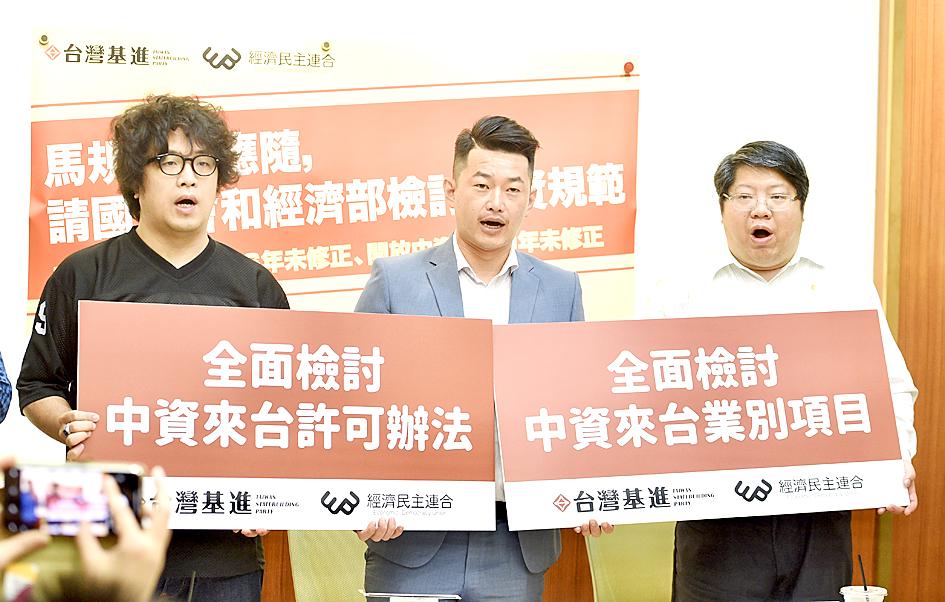Legislative amendments are needed to stop further Chinese capital making its way into Taiwan, the Economic Democracy Union said yesterday in a report.
During former president Ma Ying-jeou’s (馬英九) administration, the Measures Governing Investment Permits to the People of the Mainland Area (大陸地區人民來台投資許可辦法) and other regulations opened up the nation’s economy to Chinese investment, and several loopholes created by those measures have yet to be closed, members of the non-governmental organization told a Taipei news conference.
On April 26, 2009, the Straits Exchange Foundation and the Association for Relations Across the Taiwan Straits met in Nanjing, China, to work out details of an agreement on Chinese investment in Taiwan, and Ma’s government activated the pact’s arrangements on June 30, the report said.

Photo: Lee Jung-ping, Taipei Times
The Measures Governing Investment Permits to the People of the Mainland Area, and the Regulations Governing Permission for People From the Mainland Area to Invest in Taiwan (大陸地區之營利事業在台設立分公司或辦事處許可辦法) took effect a few days later, on July 3, it said.
On July 30, legislators added a clause to the Measures Governing Investment Permits to the People of the Mainland Area to include companies that are headquartered outside of China, but in which Chinese investors held a minimum 30 percent of shares.
In light of the 2014 Sunflower movement, the US-China technology dispute, China’s information warfare, the worsening situation in Hong Kong, and the change of power in 2016 from the Chinese Nationalist Party (KMT) to the Democratic Progressive Party, the government needs to amend laws to limit Chinese investment in the nation, the report said.
The government should also establish an effective oversight mechanism for all Chinese investments, it said.
Ma’s effort to encourage Taiwan-China economic integration set the nation on a path toward political integration, which the public does not want, as shown by the election of President Tsai Ing-wen (蔡英文), while the Sunflower movement was an expression of resistance to Ma’s China-friendly economic policies, the report said.
If the government hopes to reduce the nation’s economic reliance on China it must re-examine the laws, it said.
Trade with China also puts Taiwan at risk of being hurt by US-China trade disputes and US bans on technology exports to China, while investments in Chinese technology have also put the personal information of Taiwanese at risk, the report said.
The changing situation in Hong Kong means the government should also no longer differentiate between investment from China and that from Hong Kong, it said.
The oversight mechanism for Chinese investment is ineffective, and Chinese investors have used overseas Chinese, Hong Kongers and Taiwanese to hide the sources of their investment, the report said.
A more comprehensive investor registration system and stricter penalties for contravening investment regulations are needed to overcome this, it said.
The Economic Democracy Union grew out of the Democratic Front Against the CSSTA (Cross-Strait Service and Trade Agreement), which was organized in April 2013 to fight against the Ma government’s proposed Cross-Strait Agreement on Trade in Services.
That pact was signed on June 21, 2013, but it has never been ratified by the legislature.

The manufacture of the remaining 28 M1A2T Abrams tanks Taiwan purchased from the US has recently been completed, and they are expected to be delivered within the next one to two months, a source said yesterday. The Ministry of National Defense is arranging cargo ships to transport the tanks to Taiwan as soon as possible, said the source, who is familiar with the matter. The estimated arrival time ranges from late this month to early next month, the source said. The 28 Abrams tanks make up the third and final batch of a total of 108 tanks, valued at about NT$40.5 billion

Two Taiwanese prosecutors were questioned by Chinese security personnel at their hotel during a trip to China’s Henan Province this month, the Mainland Affairs Council (MAC) said yesterday. The officers had personal information on the prosecutors, including “when they were assigned to their posts, their work locations and job titles,” MAC Deputy Minister and spokesman Liang Wen-chieh (梁文傑) said. On top of asking about their agencies and positions, the officers also questioned the prosecutors about the Cross-Strait Joint Crime-Fighting and Judicial Mutual Assistance Agreement, a pact that serves as the framework for Taiwan-China cooperation on combating crime and providing judicial assistance, Liang

A group from the Taiwanese Designers in Australia association yesterday represented Taiwan at the Midsumma Pride March in Melbourne. The march, held in the St. Kilda suburb, is the city’s largest LGBTQIA+ parade and the flagship event of the annual Midsumma Festival. It attracted more than 45,000 spectators who supported the 400 groups and 10,000 marchers that participated this year, the association said. Taiwanese Designers said they organized a team to march for Taiwan this year, joining politicians, government agencies, professionals and community organizations in showing support for LGBTQIA+ people and diverse communities. As the first country in Asia to legalize same-sex

MOTIVES QUESTIONED The PLA considers Xi’s policies toward Taiwan to be driven by personal considerations rather than military assessment, the Epoch Times reports Chinese President Xi Jinping’s (習近平) latest purge of the Chinese People’s Liberation Army (PLA) leadership might have been prompted by the military’s opposition to plans of invading Taiwan, the Epoch Times said. The Chinese military opposes waging war against Taiwan by a large consensus, putting it at odds with Xi’s vision, the Falun Gong-affiliated daily said in a report on Thursday, citing anonymous sources with insight into the PLA’s inner workings. The opposition is not the opinion of a few generals, but a widely shared view among the PLA cadre, the Epoch Times cited them as saying. “Chinese forces know full well that